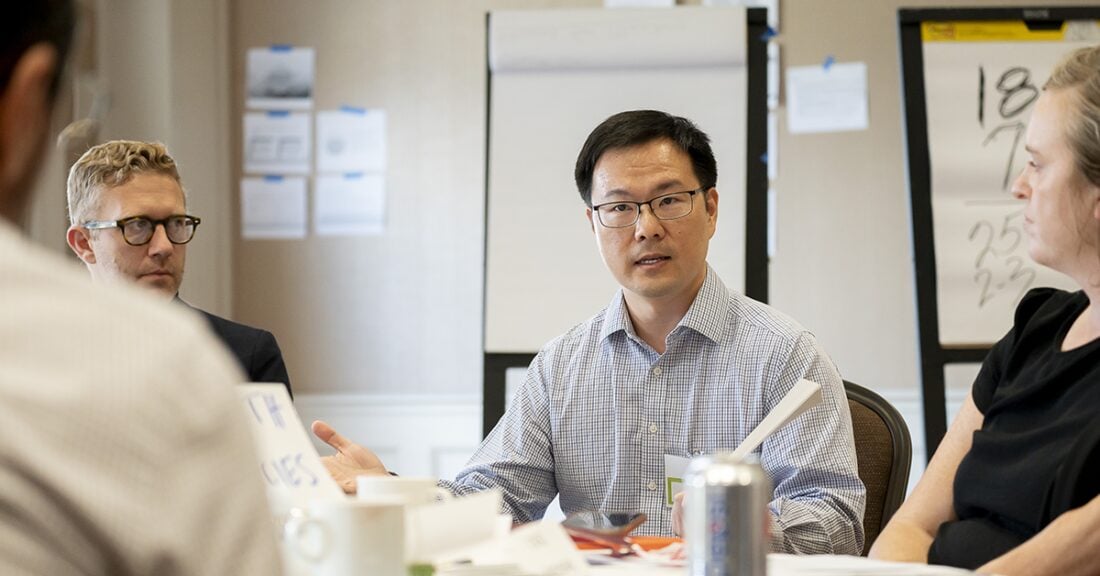2025–27 Class of Children's Health Leadership Network Named

The Annie E. Casey Foundation is pleased to announce the selection of the fourth class of the Children’s Health Leadership Network (CHLN), a rigorous Results Count® leadership development initiative. The 18-month program supports participants in building skills for system reform and stakeholder advocacy to improve health and well-being for all children in the United States and, most specifically, children at greatest risk for poor health outcomes. The 2025–27 class includes teams from Connecticut and Hawaii, each focusing on supporting children and youth with moderate-to-high behavioral health needs and their families.
Meet the Team Members of CHLN Cohort 4
Connecticut Judicial Branch
Connecticut Department of Children and Families
AskSammy Resources
Connecticut Department of Children and Families
The Child Health and Development Institute
Connecticut Department of Social Services
Connecticut Department of Children and Families
Hawaii Department of Health
Hawaii Department of Education
Hawaii Office of Youth Services
Hawaii Department of Human Services
EPIC ‘Ohana
Medicaid, Hawaii Department of Human Services
These teams bring together public sector leaders and advocates with direct experiences navigating behavioral health systems. Public agencies are represented by state leaders overseeing juvenile justice, child welfare, youth mental and behavioral health and Medicaid.
Behavioral health challenges — and the lack of adequate prevention, treatment and crisis services — are pressing issues for families across the country. The U.S. Surgeon General has identified this as a growing public health concern, citing the harmful effects of social isolation, social media and bullying, accompanied by limited access to effective prevention and early intervention support. While this issue affects many, it is especially severe for children who interact with the child welfare and juvenile justice systems or those who come to the attention of these systems due to unmet behavioral health needs.
The CHLN Experience
The 2025–27 program launches in spring 2025 with site visits; the first cohort seminar takes place in September 2025. These intensive learning sessions are designed to build skills in the areas of child health policy and system reform and Results Count leadership to improve outcomes in measurable ways.
In addition to seminars, teams will benefit from individualized coaching and technical assistance. Between formal sessions, participants will apply newly acquired skills and tools in their home systems in service of their goals.
Innovations Institute at the University of Connecticut School of Social Work is co-designing and co-facilitating the program. It has expertise in helping states, local communities and organizations implement systems of care to better support children, youth and young adults with mental health conditions. Highlights of the approach include:
- coordinating services and support across systems;
- providing high-quality, individualized and trauma-responsive care; and
- elevating the voices of youth and families in their care.
The teams will collaborate across agencies and sectors to redesign systems to ensure that all children, youth and their families have the access they need to behavioral health care.
“Children and families often must navigate multiple systems to have their needs met,” says Joe Ribsam, director of Child Welfare and Juvenile Justice Policy at the Foundation. “By collaborating across systems and with young people and parents directly, we hope this experience allows participants to shift public systems in ways that truly center all of the people they serve.”
“The experience gives leaders new tools and skills to make measurable and meaningful improvements to health outcomes while navigating an increasingly uncertain and adaptive environment,” says Marie LeBlanc, a senior associate at Casey. “Participants will use real-time tests of change to learn and accelerate progress on their long-term strategies.”
Watch: Introducing the Children’s Health Leadership Network





